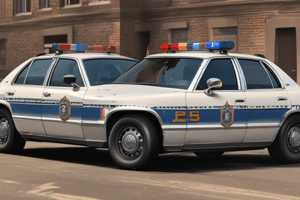Podcast
Questions and Answers
What instruction is given to the witness regarding the lineup?
What instruction is given to the witness regarding the lineup?
- To take their time in making a decision about each photograph (correct)
- To identify the culprit immediately
- To make a quick decision on the identification
- To discuss the identification procedure with other witnesses
What should the deputy/detective avoid doing during the identification procedure?
What should the deputy/detective avoid doing during the identification procedure?
- Saying or making gestures that may influence the witness' selection (correct)
- Preserving the photos in their original condition
- Asking the witness to state their certainty of the identification
- Emphasizing the importance of the identification procedure
What is the purpose of a composite diagram?
What is the purpose of a composite diagram?
- To create a specialized tool for identification (correct)
- To create a live lineup
- To document the results of the lineup
- To conduct a show-up
What is a precaution to be taken during a show-up?
What is a precaution to be taken during a show-up?
What should be done if multiple witnesses are involved in a show-up?
What should be done if multiple witnesses are involved in a show-up?
What is documented after an identification is made during a show-up?
What is documented after an identification is made during a show-up?
What is the purpose of the sequential photo lineup procedure?
What is the purpose of the sequential photo lineup procedure?
Why should the deputy/detective avoid revealing to the witness whether they did or did not make an identification?
Why should the deputy/detective avoid revealing to the witness whether they did or did not make an identification?
What should be done with the photographs after the sequential photo lineup procedure?
What should be done with the photographs after the sequential photo lineup procedure?
What is emphasized to the witness during the sequential photo lineup procedure?
What is emphasized to the witness during the sequential photo lineup procedure?
What is the purpose of using fillers in a photo lineup?
What is the purpose of using fillers in a photo lineup?
What is the minimum number of fillers required per identification procedure?
What is the minimum number of fillers required per identification procedure?
What is the purpose of using the Cogent Mugshot System (CMS)?
What is the purpose of using the Cogent Mugshot System (CMS)?
What is the purpose of recording the booking numbers in the lineup?
What is the purpose of recording the booking numbers in the lineup?
Why is it important to ensure there is no written information regarding previous arrest(s) visible to the witness?
Why is it important to ensure there is no written information regarding previous arrest(s) visible to the witness?
What is the purpose of presenting the lineup photos sequentially?
What is the purpose of presenting the lineup photos sequentially?
What is the purpose of a show-up?
What is the purpose of a show-up?
Why is it important to ensure uniformity of features between the suspect and fillers?
Why is it important to ensure uniformity of features between the suspect and fillers?
What is the purpose of having a supervisor approve the array of photos?
What is the purpose of having a supervisor approve the array of photos?
Why is blind administration important in conducting lineups?
Why is blind administration important in conducting lineups?
What is the primary purpose of this standard operating procedure?
What is the primary purpose of this standard operating procedure?
Who is responsible for overseeing the sequential photo lineup?
Who is responsible for overseeing the sequential photo lineup?
What is the role of composites in eyewitness identification?
What is the role of composites in eyewitness identification?
What is the significance of eyewitnesses in criminal investigations?
What is the significance of eyewitnesses in criminal investigations?
What is the purpose of the blind administration procedure?
What is the purpose of the blind administration procedure?
What is the scope of this standard operating procedure?
What is the scope of this standard operating procedure?
What is the significance of filing the eyewitness identification policy with the State Attorney's Office?
What is the significance of filing the eyewitness identification policy with the State Attorney's Office?
What is the composition of a lineup?
What is the composition of a lineup?
Who should document the outcome of the procedure by recording any identification results and witness' statements?
Who should document the outcome of the procedure by recording any identification results and witness' statements?
What should be included in the supplemental report?
What should be included in the supplemental report?
What should be documented in the witness' exact words?
What should be documented in the witness' exact words?
What should be recorded if the witness is unable to identify anyone?
What should be recorded if the witness is unable to identify anyone?
What should the witness be prohibited from doing?
What should the witness be prohibited from doing?
Who should receive training prior to developing and/or administering photographic lineups or show-ups?
Who should receive training prior to developing and/or administering photographic lineups or show-ups?
How often should refresher training be provided to sworn personnel?
How often should refresher training be provided to sworn personnel?
What should be documented in the sworn personnel's training history?
What should be documented in the sworn personnel's training history?
The purpose of this standard operating procedure is to provide guidelines for eyewitness identification situations in all law enforcement agencies
The purpose of this standard operating procedure is to provide guidelines for eyewitness identification situations in all law enforcement agencies
A blind administrator is aware of the suspect's identity during the lineup
A blind administrator is aware of the suspect's identity during the lineup
Composites can be used as stand-alone evidence in criminal investigations
Composites can be used as stand-alone evidence in criminal investigations
The eyewitness identification policy and procedures must be filed with the local police department
The eyewitness identification policy and procedures must be filed with the local police department
The sequential photo lineup procedure is used to intimidate witnesses
The sequential photo lineup procedure is used to intimidate witnesses
Fillers in a photo lineup are chosen based on their physical similarity to the suspect
Fillers in a photo lineup are chosen based on their physical similarity to the suspect
The primary purpose of this standard operating procedure is to protect the rights of the suspect
The primary purpose of this standard operating procedure is to protect the rights of the suspect
Eyewitness testimony is not important in criminal investigations
Eyewitness testimony is not important in criminal investigations
A sequential photo lineup presents all photos to the witness at once.
A sequential photo lineup presents all photos to the witness at once.
The Cogent Mugshot System (CMS) contains photos of only arrested individuals.
The Cogent Mugshot System (CMS) contains photos of only arrested individuals.
Fillers in a photo lineup should closely resemble the suspect.
Fillers in a photo lineup should closely resemble the suspect.
The deputy/detective should reveal to the witness whether they made an identification.
The deputy/detective should reveal to the witness whether they made an identification.
A supervisor is required to approve the array of photos before presenting it to the witness.
A supervisor is required to approve the array of photos before presenting it to the witness.
The purpose of a show-up is to gather evidence.
The purpose of a show-up is to gather evidence.
A minimum of 6 fillers are required per identification procedure.
A minimum of 6 fillers are required per identification procedure.
The deputy/detective should ensure the images in the photo lineup are outdated.
The deputy/detective should ensure the images in the photo lineup are outdated.
The witness should be able to write notes on the photos during the lineup procedure.
The witness should be able to write notes on the photos during the lineup procedure.
The lineup sequence form is used to record the order in which the photos were shown.
The lineup sequence form is used to record the order in which the photos were shown.
The deputy/detective should not obtain a statement of confidence from the witness.
The deputy/detective should not obtain a statement of confidence from the witness.
The witness should be allowed to write on or mark any photographs during the procedure.
The witness should be allowed to write on or mark any photographs during the procedure.
The results of the procedure should only be documented if the witness makes an identification.
The results of the procedure should only be documented if the witness makes an identification.
The lineup materials should be kept by the deputy/detective after the procedure.
The lineup materials should be kept by the deputy/detective after the procedure.
Only sworn personnel who have previously administered photographic lineups or show-ups need to receive training.
Only sworn personnel who have previously administered photographic lineups or show-ups need to receive training.
Refresher training is only required when there is a revision to the procedure.
Refresher training is only required when there is a revision to the procedure.
The lineup/show-up viewing instructions form should not be signed and dated by the witness.
The lineup/show-up viewing instructions form should not be signed and dated by the witness.
The deputy/detective should not document the date, time, and location of the procedure.
The deputy/detective should not document the date, time, and location of the procedure.
The witness should be shown all the photographs in the lineup at once.
The witness should be shown all the photographs in the lineup at once.
Deputies/detectives may say or make gestures to influence the witness' selection.
Deputies/detectives may say or make gestures to influence the witness' selection.
Show-ups should only be conducted within a reasonable amount of time after the crime and within a reasonable distance of the scene of the crime.
Show-ups should only be conducted within a reasonable amount of time after the crime and within a reasonable distance of the scene of the crime.
The deputy/detective should reveal to the witness whether they did or did not make an identification.
The deputy/detective should reveal to the witness whether they did or did not make an identification.
The Sheriff's Office conducts live lineups.
The Sheriff's Office conducts live lineups.
The witness should be instructed to discuss the identification procedure with other witnesses.
The witness should be instructed to discuss the identification procedure with other witnesses.
Deputies/detectives should comment on the witness' identification or non-identification.
Deputies/detectives should comment on the witness' identification or non-identification.
The photographs will be shuffled into a different order if the witness requests to see them a second time.
The photographs will be shuffled into a different order if the witness requests to see them a second time.
A composite diagram is used for identification purposes only.
A composite diagram is used for identification purposes only.
The witness will be asked to state, in their own words, how certain they are of any identification.
The witness will be asked to state, in their own words, how certain they are of any identification.
Flashcards are hidden until you start studying
Study Notes
Eyewitness Identification Procedure
- Purpose: To provide guidelines for eyewitness identification situations in criminal investigations.
Scope
- Applies to all Sheriff's Office law enforcement personnel.
Discussion
- Eyewitnesses play a vital role in solving crimes, but can also make misidentifications.
- The Sheriff's Office aims to seek reliable procedures for eyewitness identification to mitigate potential misidentification of innocent persons.
- Witness must indicate ability to recognize a suspect and/or provide a sufficiently detailed description of a suspect.
Definitions
- Lineups: A display of photos consisting of one suspect among a number of fillers from which a witness can identify a perpetrator.
- Blind Administration Procedures: An independent administrator overseeing the sequential photo lineup who does not know the desired answer.
- Composites: Sketches based on a witness' descriptive information that enables law enforcement officers to better perceive how a suspect may appear.
- Cogent Mugshot System (CMS): A web-based application containing photos of individuals previously arrested.
- Fillers: Photographs of persons other than the suspect used to complete a photo array.
- Sequential Photo Lineup: Photos viewed by the witness one at a time in random order.
- Show-ups: A field identification procedure performed when circumstances require prompt display of a single suspect to a witness.
Procedure
- Composing Lineups:
- Include only one suspect in each identification procedure.
- Select fillers who generally fit the witness' description of the perpetrator.
- Use CMS to select fillers with specific physical characteristics consistent with the suspect's description.
- Ensure images are contemporary and not outdated.
- Complete uniformity of features is not required.
- Avoid using fillers that closely resemble the suspect.
- Conducting Lineups:
- Present photos to the witness one at a time in random order.
- Use blind administration procedures to eliminate the possibility of unintentionally influencing the witness' selection.
- Record the booking numbers in the lineup, the position number of the suspect photo, and document utilizing the lineup sequence form in a supplemental report.
Other Methods of Identification
- Composites: A specialized tool provided by an approved vendor that may be utilized by detectives.
- Show-ups:
- Understand that show-ups can be suggestive.
- Determine and document the description of the perpetrator prior to the show-up.
- Transport the witness to the location of the detained subject to limit the legal impact of the subject's detention and crime scene contamination.
- Caution the witness that the person they are looking at may or may not be the perpetrator.
- Document a statement of certainty if identification is made.
Documenting the Results of the Lineup
- Note in the supplemental report the presentation of the lineup as an independent administrator.
- Preserve the outcome of the procedure by recording any identification results and witness' statements.
- Document the date, time, and location of the procedure.
- Document the procedure employed (e.g., sequential photo lineup or show-up) in the supplemental report.
- Document the witness' exact words and obtain a statement of confidence.
Training
- All sworn personnel shall receive training prior to developing and/or administering photographic lineups or show-ups.
- Refresher training shall be provided to all sworn personnel periodically.
- Lineup/Show-up refresher training provided to sworn personnel shall be documented in their training history.
Eyewitness Identification Procedure
- Purpose: To provide guidelines for eyewitness identification situations in criminal investigations.
Scope
- Applies to all Sheriff's Office law enforcement personnel.
Discussion
- Eyewitnesses play a vital role in solving crimes, but can also make misidentifications.
- The Sheriff's Office aims to seek reliable procedures for eyewitness identification to mitigate potential misidentification of innocent persons.
- Witness must indicate ability to recognize a suspect and/or provide a sufficiently detailed description of a suspect.
Definitions
- Lineups: A display of photos consisting of one suspect among a number of fillers from which a witness can identify a perpetrator.
- Blind Administration Procedures: An independent administrator overseeing the sequential photo lineup who does not know the desired answer.
- Composites: Sketches based on a witness' descriptive information that enables law enforcement officers to better perceive how a suspect may appear.
- Cogent Mugshot System (CMS): A web-based application containing photos of individuals previously arrested.
- Fillers: Photographs of persons other than the suspect used to complete a photo array.
- Sequential Photo Lineup: Photos viewed by the witness one at a time in random order.
- Show-ups: A field identification procedure performed when circumstances require prompt display of a single suspect to a witness.
Procedure
- Composing Lineups:
- Include only one suspect in each identification procedure.
- Select fillers who generally fit the witness' description of the perpetrator.
- Use CMS to select fillers with specific physical characteristics consistent with the suspect's description.
- Ensure images are contemporary and not outdated.
- Complete uniformity of features is not required.
- Avoid using fillers that closely resemble the suspect.
- Conducting Lineups:
- Present photos to the witness one at a time in random order.
- Use blind administration procedures to eliminate the possibility of unintentionally influencing the witness' selection.
- Record the booking numbers in the lineup, the position number of the suspect photo, and document utilizing the lineup sequence form in a supplemental report.
Other Methods of Identification
- Composites: A specialized tool provided by an approved vendor that may be utilized by detectives.
- Show-ups:
- Understand that show-ups can be suggestive.
- Determine and document the description of the perpetrator prior to the show-up.
- Transport the witness to the location of the detained subject to limit the legal impact of the subject's detention and crime scene contamination.
- Caution the witness that the person they are looking at may or may not be the perpetrator.
- Document a statement of certainty if identification is made.
Documenting the Results of the Lineup
- Note in the supplemental report the presentation of the lineup as an independent administrator.
- Preserve the outcome of the procedure by recording any identification results and witness' statements.
- Document the date, time, and location of the procedure.
- Document the procedure employed (e.g., sequential photo lineup or show-up) in the supplemental report.
- Document the witness' exact words and obtain a statement of confidence.
Training
- All sworn personnel shall receive training prior to developing and/or administering photographic lineups or show-ups.
- Refresher training shall be provided to all sworn personnel periodically.
- Lineup/Show-up refresher training provided to sworn personnel shall be documented in their training history.
Studying That Suits You
Use AI to generate personalized quizzes and flashcards to suit your learning preferences.




